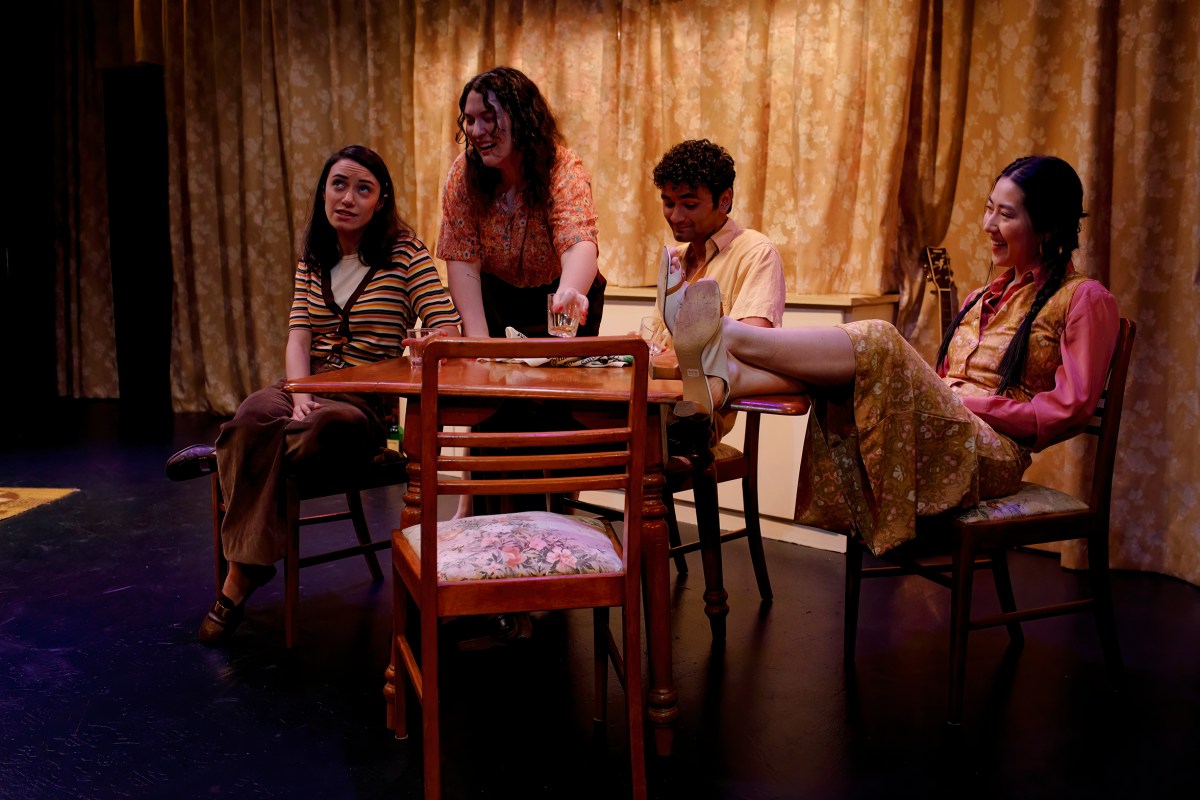The truth was dawning on me of how terrifying it was not to be numb, but to be aware, to have facts, retain facts, be adult.
(Milkman by Anna Burns, Faber, 2018)
Burns’ 2018 Man Booker Prize-winning novel traces the journey of an 18-year-old protagonist, and the trauma that she carries with her as a teen that continues to haunt and control her life well into adulthood.
I open with this quote from Burns, because the parallels between Never Closer, the play written by Grace Chapple that recently wrapped up its run at 25A, and Burns’ book Milkman, are direct and obvious. Both are stories set against the backdrop of The Troubles, the violent 30-year conflict from the 1960s to the 90s that ravaged Northern Ireland, the ghost of which rears its ugly head from time to time, even today. Both are stories that revolve around examining what scars and self-inflicted wounds remain when young people are forced to suppress their trauma over a long period of time. Both are stories about wanting to heal, wanting to leave the past in the past, but not knowing how.
In Never Closer, we first meet a group of friends in 1970s Northern Ireland at the end of their school life. All of them have plans about what they want to do next, but are unsure about how to put them into action. All except one. Niamh (Mabel Li) is going to travel to England and study medicine.
Cut to a decade later. Their lives haven’t turned out as they imagined. In fact, all of them, in their own ways, are still stuck where they left each other 10 years ago. As fate would have it, they meet up again on Christmas Eve. Niamh also returns with an unexpected guest, her English fiancé Harry (Philip Lynch), after complete radio silence. It should be a happy reunion, but isn’t. Wounds that have been festering for over a decade and were thought to be healed are suddenly reopened. The big question is: whose pain is greater and more valid? Those who leave or those who get left behind?
The structure of Never Closer is like a locked room mystery, a kind of whodunnit, if you like. The only difference being – the thing to find out isn’t the identity of any murderer, but rather, what secrets these characters have been hiding over these many years and what ramifications there will be once they come tumbling out.
Imagine you’re locked in a room with your closest friends, those who know your best and worst secrets. Rather than protect you, however, they’re hellbent on hurting you – to use your secrets against you. Not because of any deliberate malice, but because they’re hurting themselves.
Everything – every little piece of dialogue, suggestion, gesture and that which remains unsaid – everything is loaded. And Chapple has so much fun with this premise. Her clear strength is dialogue, and she uses the constant back-and-forth between the friends to set up this tightly woven ticking time bomb of a script – relying on the pent-up anger and unresolved trauma of these characters and the environment in which they find themselves – to show how it can have unintended, yet drastic consequences.
The director Hannah Goodwin uses the Downstairs Theatre space cleverly. This is a script and story that’s meant to invoke a sense of claustrophobia – manifesting the dictum from Jean-Paul Sartre’s No Exit that ‘hell is other people’. And given how small the Downstairs Theatre can feel at times where, even while sitting in the audience, a part of you can also be inhabiting the performance stage, this sense of claustrophobia and tension is heightened.
These characters find themselves in a situation where they want some space from each other, they want to leave, to breathe. But they can’t. As part of the audience who can practically touch the actors, you feel it too. It’s a beautiful marriage of the right script finding the right performance space.
The costumes by Keerthi Subramanyam have nice retro touches of 70s and 80s dressing styles. Set design by Grace Deacon is simple, but effective. The house where our characters reunite has a gothic sensibility, perfectly evoking the sense that time has stood still here for many years. Special mention to dialect coach Laura Farrell. The Irish accents were impeccable and the obvious shifts between English and Irish inflections were handled with extreme ease.
The performances by the entire ensemble cast were excellent. Each of the actors elevated their parts through the choices they made on stage. For this kind of a largely single-setting, locked room story to work its magic, the performers need to a lot of heavy lifting to keep things engaging.
Read: Theatre review: SIRENS, Melbourne
In particular, I was completely taken in by Adam Sollis’ delightfully unhinged turn as Conor. His character had many complicated shades and he balanced them all perfectly. I liked Harry’s arc and Philip Lynch infused a lot more humanity in him than I was expecting, given that he starts out as comic relief. Mabel Li’s subtle accent changes were precise and felt believable.
Never Closer is a cautionary tale about what happens when we’re unable to move on and the nostalgic shadow of the past looms so large that it consumes our present and the future.
Never Closer by Grace Chapple
Presented by Essential Workers
Belvoir Street Theatre, NSW
Director: Hannah Goodwin
Producer: Zoë Hollyoak
Set Designer: Grace Deacon
Composer/Sound Designer: Alyx Dennison
Costume Designer: Keerthi Subramanyam
Design Assistant: Blake Hedley
Lighting Designer: Phoebe Pilcher
Dialect Coach: Laura Farrell
Stage Manager: Darcy Catto-Pitkin
Intimacy and Fight Director: Nigel Poulton
Actors: Emma Diaz, Raj Labade, Mabel Li, Philip Lynch, Ariadne Sgouros, Adam Sollis
Never Closer was performed from 4-16 October 2022.





